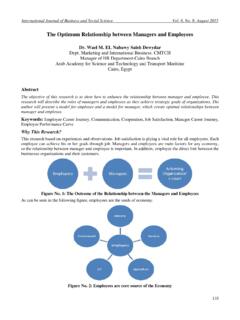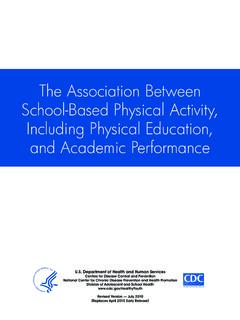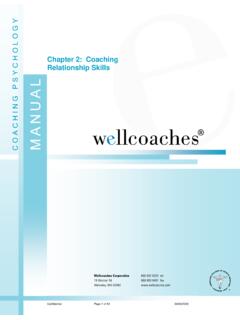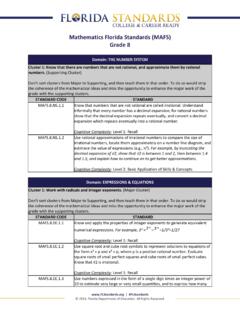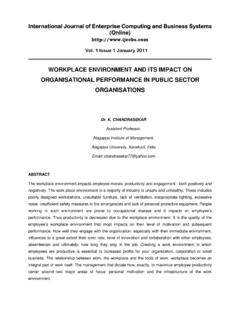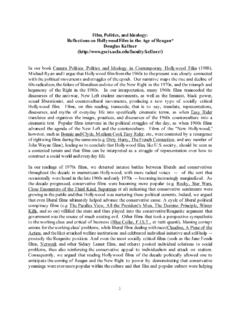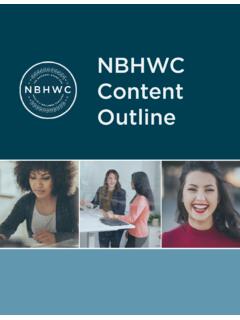Transcription of Education as a Practice of Freedom: Reflections on bell hooks
1 Journal of Education and Practice ISSN 2222-1735 (Paper) ISSN 2222-288X (Online) , , 2015 195 Education as a Practice of Freedom: Reflections on bell hooks Akello Specia and Ahmed A. Osman Moi University, School of Education , Department of Curriculum, Instruction and Educational Media , Box 3900-30100 Eldoret, Kenya Abstract This paper critically analyses the conceptions of bell hooks on Education . It focuses on the relevance of hook s ideas to the classroom. It is a theoretical paper based on secondary data that seeks to contribute to the growing body of knowledge in Education . The paper is a reflection of hook s reaction to Education as a Practice of freedom, the feminist theory, progressive holistic Education and pedagogy of hope.
2 Hook s ideologies also revolve around her philosophy of the classroom based on race, capitalism, gender, oppression, class domination, liberation, collaboration and praxis in teaching and learning. Freedom in Education gives teaching a performative act that offers space for change, invention, spontaneous shifts and can serve as a catalyst drawing out the unique element in each classroom. The transformed and transformative classrooms are a testament to hook s vision of changing the way we think of pedagogy as liberatory for all involved in Education , from the teacher to the student and institutions we teach and learn in everyday. Key words: Freedom, Education , liberation, gender, race, literacy, culture. Introduction The paper focuses on the philosophy of bell hooks whose ideas have subsequently influenced many people across the world.
3 Throughout her career, students; male and female, white or colored, queer and straight have responded beautifully to hook s call to become self-actualized through feminist Practice . Through feminist Education , students from all walks of life have had an explosion of freedom. As hooks would say, it is Education as the Practice of freedom. Students want to be assured so that they can contribute to it and make it their own. Progressive holistic Education and engaged pedagogy is more demanding than conventional critical or feminist pedagogy. This is because it emphasizes the well-being and a process of self-actualization. It is hook s belief in reflection and praxis or action that makes it possible for teachers to teach theoretically and then one day, students will act on such issues. hooks has shaken young people s minds and hearts to care about themselves and their world.
4 In her book Teaching to Transgress, hook s shares her, philosophy of the classroom by offering ideas about teaching that fundamentally rethink democratic participation. She writes about the new kind of Education . She advocates the process of teaching students to think critically and raises many concerns central to the field of critical pedagogy, linking them to the feminist thought. In the process, her contribution face squarely the problems of teachers who do not want to teach, of students who do not want to learn of racism and sexism in the classroom. Teaching students to transgress against racial, sexual and class boundaries in order to achieve the gift of freedom is for hooks , the teacher s most important goal ( hooks , 1994). This paper therefore analyses bell hook s major themes such as: a. Education as a Practice of freedom.
5 This is a new kind of Education that advocates for the process of teaching students to think critically. b. Women s liberation around the themes of culture, gender, race and class. c. Progressive, holistic Education in engaged pedagogy which is more demanding. These teaching practices emphasize on the well-being of students. d. Hook s thinking around the concept of literacy and consciousness were heavily influenced by Paulo Freire. e. The notion of praxis is recurring in her works. Education as a Practice of freedom Education as the Practice of freedom is a way of teaching that anyone can learn. The learning process comes easiest to those of us who teach, who also believe that there is an aspect of our vocation that is sacred: who believe that our work is not merely to share information but to share in the intellectual and spiritual growth of our students.
6 To teach in a manner that respects and cares for the souls of our students is essential if we are to provide the necessary conditions where learning can most deeply and intimately ( hooks , 1994). hooks goes on to stress the demands this freedom places upon educators in terms of authenticity and commitment. Teachers must be actively involved and committed to the process of self actualization that promotes their own well-being if they are to teach in a manner that empowers students ( hooks , 1994). Teachers must be aware of themselves as practitioners and as human beings if they wish to teach students in a non-threatening, anti-discriminatory way. Self-actualization should be the goal of the teacher as well as students. Teaching students to transgress against racial, sexual and class boundaries in order to achieve the gift of freedom, is for hook s the Journal of Education and Practice ISSN 2222-1735 (Paper) ISSN 2222-288X (Online) , , 2015 196 teacher s most important goal.
7 hooks speaks to the heart of Education today: how can we rethink of teaching practices in the age of multiculturalism? How should we deal with racism and sexism in the classroom? hooks investigated the classroom as a source of constraint but also a potential source of liberation. She advocated that universities should encourage students and teachers to transgress and sought ways to use collaboration to make learning more relaxing and exciting. Teaching is a catalyst that calls everyone to become more and more engaged. For hooks , teaching is a performative act that offers the space for change, invention, spontaneous shifts, that can serve as a catalyst drawing out the unique element in each classroom ( hooks , 1984). She makes the point that what is needed are mass-based political movements calling on citizens to uphold democracy and the rights of everyone to be educated, to work on behalf of ending domination in all of its forms to work for justice, changing the educational system so that schooling is not the site where students are indoctrinated to support what she refers to as imperialist white-supremacist capitalist patriarchy or any ideology, but rather where they learn to open their minds, to engage in rigorous study and to think critically.
8 Hers is a unique voice-and a hopeful one. The academy is not paradise. But learning is a place where paradise can be created. The classroom with all its limitations remains a location of possibility. In that field of possibility, we have the opportunity to labour for freedom, to demand of ourselves and our comrades, an openness of mind and heart that allows us to face reality even as we collectively imagine ways to move beyond boundaries, to transgress. This is Education as the Practice of freedom ( hooks , 1994). The above arguments were ideally influenced by John Dewey. Freedom is the process that draws on the creative energy of the teachers, students and the school administration in developing a unique vision for the institution. It is an aspect that protects the rights of the free speech in a meaningful sense of term without coercion or hindrance.
9 The purpose of the school is to facilitate learning and it must guard its environment from disturbing influences. Liberation and feminism Bell hooks is an American scholar whose work examined the varied perceptions of black women and black women writers and the development of feminist identities. She is devoted to critical consciousness and awareness of oneself and society. She made her commitment to intellectual life in the segregated black world of her childhood. hooks (1982) urges an end to the degradation and exploitation of black women arguing that this is an integral step in alleviating white supremacy. Part of her efforts was to bring the cultural concerns of African American women into the main stream feminist movement. hooks had long been troubled by the absence of women of color in women's studies courses. The mainstream feminist movement had focused mostly on the plight of a group of white, college-educated, middle and upper class women who had little to no stake in the concerns of women of color ( hooks , 1982).
10 In her research, hooks found that historically, women of color often found themselves in a double-bind. By supporting the suffrage movement, they would have to ignore the racial aspect of womanhood and if they supported the Civil Rights Movement, they would be subjected to the same patriarchal order that dogged all women. hooks philosophical work centres around the need to articulate and recognize a feminist theory of empowerment that was accessible to people of color. hooks argues that feminists have not succeeded in creating political solidarity with women of different ethnicities or socio economic classes. She feels there is need to be a more transformative politics that is not rooted in Western ideology. She believes that intimate sentiments reinstitute the ideology that feminism aims to change.










